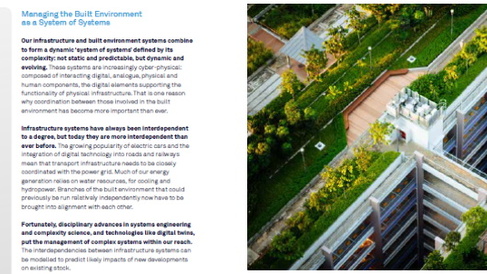
Dr Timea Nochta, CSIC Senior Research Associate, offers insights on digital twins and decarbonisation challenges in a report entitled States Regenerate: Greening Government for our Planet, Wealth, and Health by StateUp, an international intelligence and advisory firm for public-purpose technology that works with governments, international organisations, investors and research bodies.
States Regenerate features expert contributions by climate policy and green technology experts from the UK Geospatial Commission and leading academics from Cambridge, Oxford and Yale Universities. The report offers recommendations on how global government can shift £7.8 trillion towards green purchasing to foster decarbonisation efforts. The report also identifies 50 of the top public-purpose technology companies across the world and marks the launch of Nebula, the first global public-purpose tech intelligence platform bridging the information gap between public-purpose innovators, policy and investment decision makers.
Digital twins – realistic digital representations of physical assets, systems and processes – can make a significant contribution towards building an information environment that can support policy and direct interventions to deliver on decarbonisation commitments Dr Timea Nochta
Dr Tanya Filer, StateUp founder and CEO, who also leads the Digital State programme at the Bennett Institute for Public Policy, University of Cambridge: said: “Governments that invest in decarbonising their own operations will reap benefits in terms of a head start in meeting climate goals, health benefits from cleaner air and more liveable buildings, and economic benefits in terms of economic stimulus: new skills, new jobs, and new companies.”
Dr Timea Nochta’s contribution - ‘Why digital twins are critical for climate change mitigation’ - addresses governments’ challenge to finance and manage major assets such as public infrastructure. This was part of the 'Decarbonising Physical Infrastructure and the Built Environment' section.
Dr Nochta argues that infrastructures should be considered from a systemic perspective, as ‘dynamic system of systems’: “Digital twins – realistic digital representations of physical assets, systems and processes – can make a significant contribution towards building an information environment that can support policy and direct interventions to deliver on decarbonisation commitments”.
She also points out that realising such benefits is not straightforward. Instead of viewing them as standalone technology ‘fixes’, governments and asset owners must consider digital twins as elements of broader digital strategies. This will help designing and implementing digital twins that are purpose- and challenge-driven, and consider the requirements of a diverse set of stakeholders.
As an example, ongoing work at CSIC considers the integration of digital technology into roads and railways, enabling transport infrastructure to be coordinated with the power grid. Digital twin technology can support the governance of complex systems and help public authorities to plan, manage and monitor use, schedule necessary maintenance and prevent failure, thanks to innovation in information management and data science.
Innovation in materials should also be harnessed to lower embodied carbon, calculate impact and ensure longevity of assets. A data management approach to construction, such as BIM, will also reduce waste, improve health and safety, boost efficiency and ultimately lower costs.
Green technologies will also help to monitor and manage energy consumption in buildings, including older ones, which might need retrofitting investment. This is particularly relevant to government-owned building stock, which tends to be older. The adoption of innovative ways of constructing and managing existing assets will support policy and direct intervention to deliver decarbonisation goals, benefitting local communities.
Further reading
Cambridge CDT Project
https://www.pbctoday.co.uk/news/construction-technology-news/city-scale-digital-twins/68014/
https://www.connectingcambridgeshire.co.uk/wp-content/uploads/2020/10/CBC-City-Digital-Twin-Experiment.pdf
https://www.tandfonline.com/doi/full/10.1080/10630732.2020.1798177- Dr Timea Notcha’s contribution: ‘Why digital twins are critical for climate change mitigation’
- States Regenerate (full report)
- States Regenerate: The key ideas + 50 startups to green government (summary, free access). Experts’ quotes: https://www.youtube.com/watch?v=8awZ9lqudOg
